How a traumatised dog inspired a sharing economy business
- Published
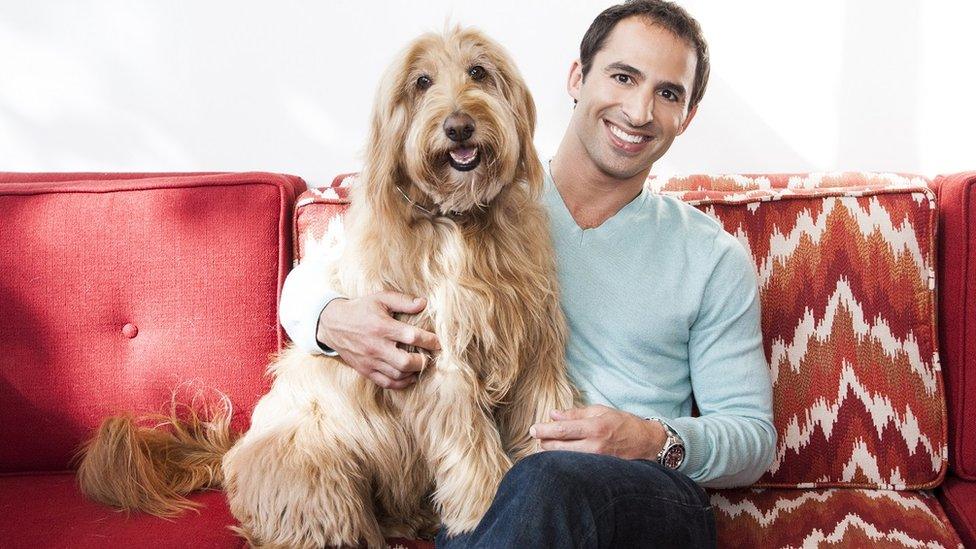
Aaron Hirschhorn and his golden labradoodle Rocky
Before Aaron Hirschhorn went travelling, he put Rocky, his beloved golden labradoodle, into kennels.
"But I came back to a $1,400 bill and my dog Rocky hiding under my desk, clearly traumatised, for about three days," he says.
So he decided to start a company, Santa Monica-based DogVacay, to match travelling dog owners with host families, instead of traditional kennels.
Mr Hirschhorn and his wife were the first hosts, looking after 110 dogs in their home in the first year. They earned $35,000 (£28,185) which they used to develop a website.
DogVacay hosts - there are now 35,000 - are normally fellow dog owners, says Mr Hirschhorn. Owners can opt to receive daily photos of their pets by way of reassurance.
The website and obligatory app feature profiles of the hosts, their locations, and charges. And you can book and pay online.
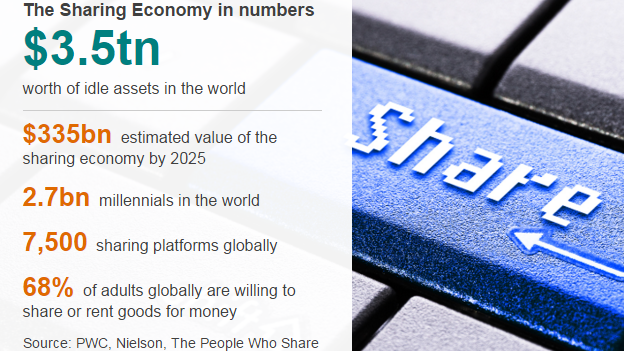
This is just one of many similar businesses that have sprung up in what's becoming known as the sharing economy.
Location-tracking smartphones and online marketplaces have made it much easier for people to share what they own, whether that's a home, a car, or their services.
Burning ambition
The idea is that by making better use of surplus capacity - things sitting idle for much of the time - we can cut costs, reduce waste and live more sustainably. Uber and Airbnb are the two biggest global examples of this phenomenon.
In the digital age, why own CDs when you can stream music via Spotify or Deezer? Why own DVDs when you can stream films via Netflix? And why pay for software on CDs when you can subscribe to services like Microsoft Office 365 and download all future updates from the cloud?
The sharing economy is currently worth £9bn, estimates consultancy PwC, but this could rise to £230bn by 2025.
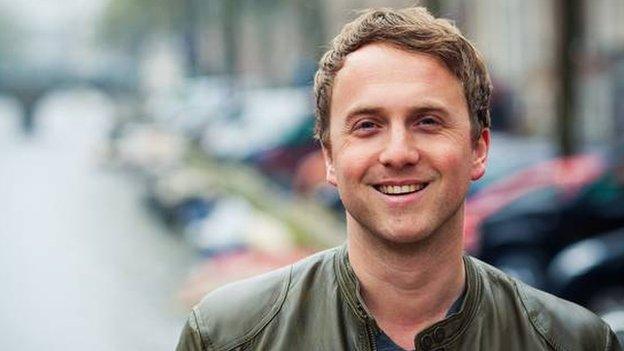
Daan Weddepohl had to borrow from friends after losing all his possessions in a fire
Younger generations in particular are questioning why they need to own goods when they can simply rent them.
When Daan Weddepohl's house burned down in Amsterdam he lost all his possessions and had to borrow everything he needed from friends.
But the disaster spurred him on to found Dutch sharing start-up, Peerby.
"The average power drill is used for between 9 and 17 minutes during its lifetime," says Mr Weddepohl. "And we use 80% of our belongings just once a month."
The Peerby app lets you rent or borrow a neighbour's tools or appliances for just the short period you need them.
The firm now has close to $1bn worth of belongings currently available for others to use, says Mr Weddepohl, and last year raised $2.2m in a crowdfunding exercise.
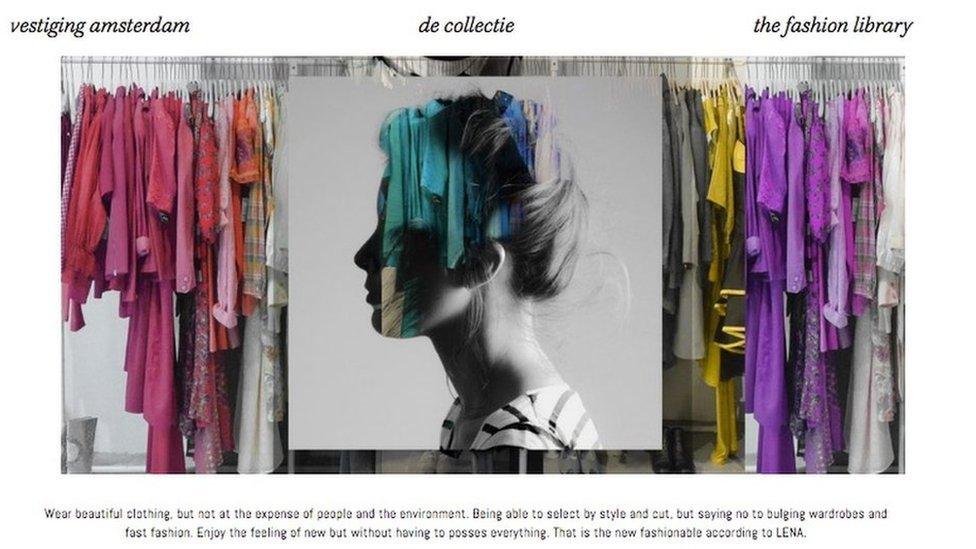
Lena Fashion Library's Suzanne Smulders wants to reduce clothes waste
Owners of products can set themselves up as "super neighbours" and charge a small fee when someone rents a piece of equipment, earning up to €250 (£222; $276) a month, the company says.
Another Dutch start-up, the Lena Fashion Library, lets you "check out" clothes for five days instead of buying them. Members pay €19.95 a month to subscribe.
Its co-founder, Suzanne Smulders, says 240 million kilograms of clothes are thrown away each year in the Netherlands alone.
'So flawless, so easy'
This sharing approach could shift us away from a mass production, mass consumption mentality, Mr Weddepohl believes, towards "making high-quality products that are easy to repair, easy to maintain, and easy to recycle".
He even goes so far as to say, "The [manufacturers] creating products that don't last as long will have a problem surviving. And actually, I think that's a good thing."
But he admits that changing minds is not easy in a culture where "buying has been made so convenient, so flawless, so easy."
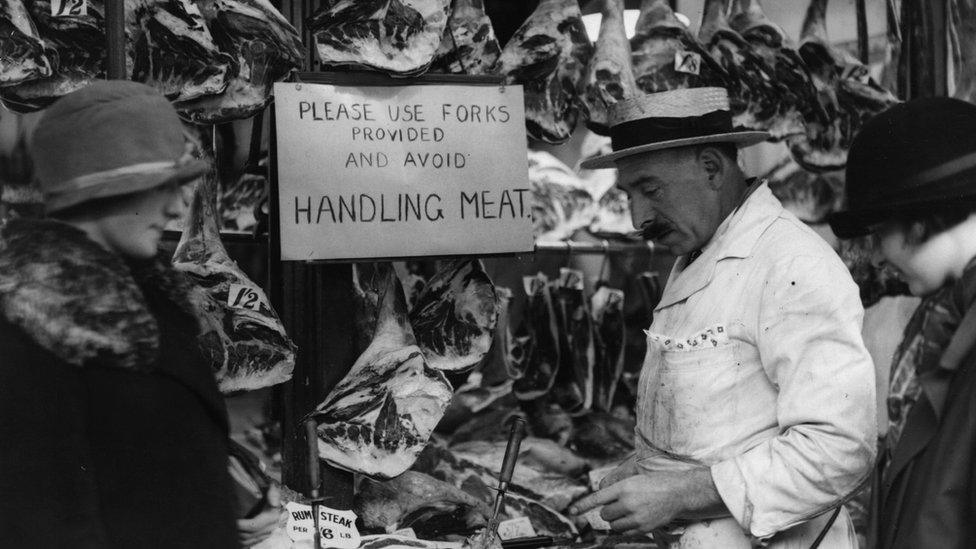
Zuora's Tien Tzuo thinks the sharing economy will revive traditional customer relationships
DogVacay's Aaron Hirschhorn is also cautiously optimistic. "Sharing is these days slowly but steadily becoming the most effective form of organising things," he says.
Although getting people to trust strangers with their dogs is "pretty tough", he concedes.
Establishing trust is a key element of the sharing economy, which is why vetting service providers and rating them is so important, devotees say.
It's also about reintroducing human relationships to commerce.
"It was a much more natural way 100 years ago, when we went to our local butcher, baker, carpenter - a relationship where you knew each other," says Tien Tzuo, founder of San Francisco-based Zuora, a firm that offers finance and billing systems for sharing economy businesses.
'Do we want this?'
But the sharing economy also has its critics, with some seeing it as a way of avoiding employment laws and as a source of unfair competition for regulated businesses.
Last month in the UK, Uber drivers won the right to be classed as employees entitled to holiday pay and the national minimum wage - a decision that threatens the taxi-hailing app's entire business model.
In Spain, bus operators have taken legal action against car-sharing service BlaBlaCar, arguing that some drivers are effectively offering a taxi service without paying for the proper licences.
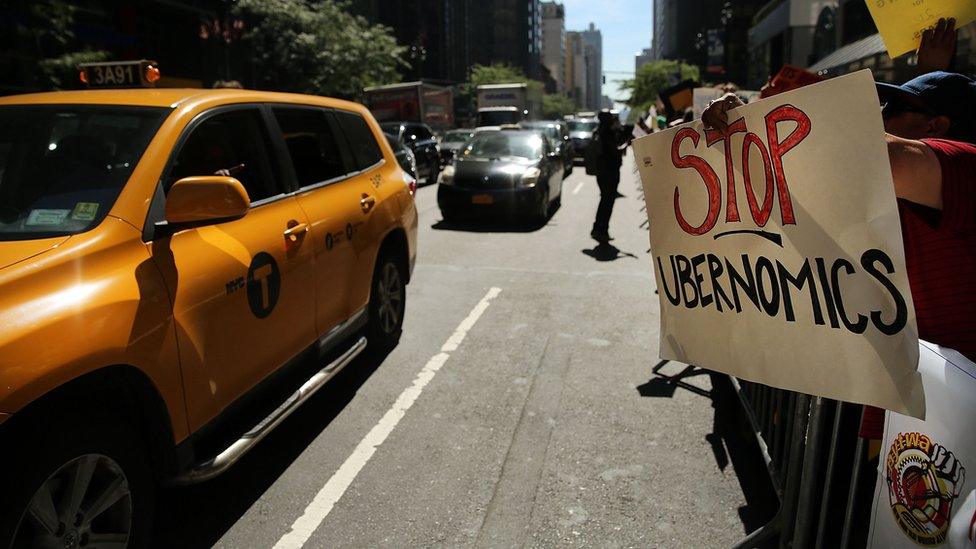
New sharing economy business models such as Uber's have upset established firms
And in the Netherlands, Airbnb has proved so popular the government has had to impose limits on how often people can rent out their homes.
Under the rules, residents can rent their properties for up to two months of the year, to up to four people at a time. But visitors have to pay the same tourist tax as hotel guests.
"We now see the downside of home sharing, where people buy a house and rent it out all year as an illegal hotel," says Sebastiaan Meijer, spokesman for the city of Amsterdam.
"You see streets changing," he says, leading to protesting neighbours. "In some, you wonder if there are more tourists than residents, and then you wonder: do we want this?"
